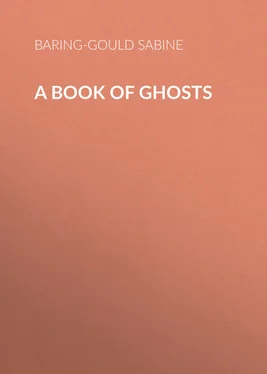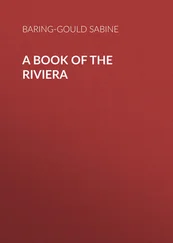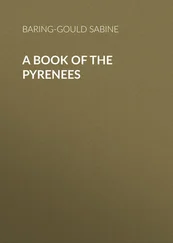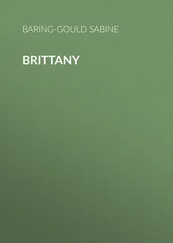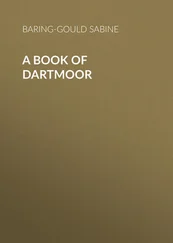Sabine Baring-Gould - A Book of Ghosts
Здесь есть возможность читать онлайн «Sabine Baring-Gould - A Book of Ghosts» — ознакомительный отрывок электронной книги совершенно бесплатно, а после прочтения отрывка купить полную версию. В некоторых случаях можно слушать аудио, скачать через торрент в формате fb2 и присутствует краткое содержание. Жанр: foreign_antique, foreign_prose, на английском языке. Описание произведения, (предисловие) а так же отзывы посетителей доступны на портале библиотеки ЛибКат.
- Название:A Book of Ghosts
- Автор:
- Жанр:
- Год:неизвестен
- ISBN:нет данных
- Рейтинг книги:5 / 5. Голосов: 1
-
Избранное:Добавить в избранное
- Отзывы:
-
Ваша оценка:
- 100
- 1
- 2
- 3
- 4
- 5
A Book of Ghosts: краткое содержание, описание и аннотация
Предлагаем к чтению аннотацию, описание, краткое содержание или предисловие (зависит от того, что написал сам автор книги «A Book of Ghosts»). Если вы не нашли необходимую информацию о книге — напишите в комментариях, мы постараемся отыскать её.
A Book of Ghosts — читать онлайн ознакомительный отрывок
Ниже представлен текст книги, разбитый по страницам. Система сохранения места последней прочитанной страницы, позволяет с удобством читать онлайн бесплатно книгу «A Book of Ghosts», без необходимости каждый раз заново искать на чём Вы остановились. Поставьте закладку, и сможете в любой момент перейти на страницу, на которой закончили чтение.
Интервал:
Закладка:
Sabine Baring-Gould
A Book of Ghosts
PREFACE
Some of the stories in this volume have already appeared in print. "The Red-haired Girl" in The Windsor Magazine ; "Colonel Halifax's Ghost Story" in The Illustrated English Magazine ; "Glámr" I told in my Iceland: Its Scenes and Sagas , published in 1863, and long ago out of print. "The Bold Venture" appeared in The Graphic ; "The 9.30 Up-train" as long ago as 1853 in Once a Week .
JEAN BOUCHON
I was in Orléans a good many years ago. At the time it was my purpose to write a life of Joan of Arc, and I considered it advisable to visit the scenes of her exploits, so as to be able to give to my narrative some local colour.
But I did not find Orléans answer to my expectations. It is a dull town, very modern in appearance, but with that measly and decrepit look which is so general in French towns. There was a Place Jeanne d'Arc, with an equestrian statue of her in the midst, flourishing a banner. There was the house that the Maid had occupied after the taking of the city, but, with the exception of the walls and rafters, it had undergone so much alteration and modernisation as to have lost its interest. A museum of memorials of la Pucelle had been formed, but possessed no genuine relics, only arms and tapestries of a later date.
The city walls she had besieged, the gate through which she had burst, had been levelled, and their places taken by boulevards. The very cathedral in which she had knelt to return thanks for her victory was not the same. That had been blown up by the Huguenots, and the cathedral that now stands was erected on its ruins in 1601.
There was an ormolu figure of Jeanne on the clock – never wound up – upon the mantelshelf in my room at the hotel, and there were chocolate figures of her in the confectioners' shop-windows for children to suck. When I sat down at 7 p.m. to table d'hôte, at my inn, I was out of heart. The result of my exploration of sites had been unsatisfactory; but I trusted on the morrow to be able to find material to serve my purpose in the municipal archives of the town library.
My dinner ended, I sauntered to a café.
That I selected opened on to the Place, but there was a back entrance near to my hotel, leading through a long, stone-paved passage at the back of the houses in the street, and by ascending three or four stone steps one entered the long, well-lighted café. I came into it from the back by this means, and not from the front.
I took my place and called for a café-cognac. Then I picked up a French paper and proceeded to read it – all but the feuilleton. In my experience I have never yet come across anyone who reads the feuilletons in a French paper; and my impression is that these snippets of novel are printed solely for the purpose of filling up space and disguising the lack of news at the disposal of the editors. The French papers borrow their information relative to foreign affairs largely from the English journals, so that they are a day behind ours in the foreign news that they publish.
Whilst I was engaged in reading, something caused me to look up, and I noticed standing by the white marble-topped table, on which was my coffee, a waiter, with a pale face and black whiskers, in an expectant attitude.
I was a little nettled at his precipitancy in applying for payment, but I put it down to my being a total stranger there; and without a word I set down half a franc and a ten centimes coin, the latter as his pourboire . Then I proceeded with my reading.
I think a quarter of an hour had elapsed, when I rose to depart, and then, to my surprise, I noticed the half-franc still on the table, but the sous piece was gone.
I beckoned to a waiter, and said: "One of you came to me a little while ago demanding payment. I think he was somewhat hasty in pressing for it; however, I set the money down, and the fellow has taken the tip, and has neglected the charge for the coffee."
" Sapristi! " exclaimed the garçon ; "Jean Bouchon has been at his tricks again."
I said nothing further; asked no questions. The matter did not concern me, or indeed interest me in the smallest degree; and I left.
Next day I worked hard in the town library. I cannot say that I lighted on any unpublished documents that might serve my purpose.
I had to go through the controversial literature relative to whether Jeanne d'Arc was burnt or not, for it has been maintained that a person of the same name, and also of Arques, died a natural death some time later, and who postured as the original warrior-maid. I read a good many monographs on the Pucelle, of various values; some real contributions to history, others mere second-hand cookings-up of well-known and often-used material. The sauce in these latter was all that was new.
In the evening, after dinner, I went back to the same café and called for black coffee with a nip of brandy. I drank it leisurely, and then retreated to the desk where I could write some letters.
I had finished one, and was folding it, when I saw the same pale-visaged waiter standing by with his hand extended for payment. I put my hand into my pocket, pulled out a fifty centimes piece and a coin of two sous, and placed both beside me, near the man, and proceeded to put my letter in an envelope, which I then directed.
Next I wrote a second letter, and that concluded, I rose to go to one of the tables and to call for stamps, when I noticed that again the silver coin had been left untouched, but the copper piece had been taken away.
I tapped for a waiter.
" Tiens ," said I, "that fellow of yours has been bungling again. He has taken the tip and has left the half-franc."
"Ah! Jean Bouchon once more!"
"But who is Jean Bouchon?"
The man shrugged his shoulders, and, instead of answering my query, said: "I should recommend monsieur to refuse to pay Jean Bouchon again – that is, supposing monsieur intends revisiting this café."
"I most assuredly will not pay such a noodle," I said; "and it passes my comprehension how you can keep such a fellow on your staff."
I revisited the library next day, and then walked by the Loire, that rolls in winter such a full and turbid stream, and in summer, with a reduced flood, exposes gravel and sand-banks. I wandered around the town, and endeavoured vainly to picture it, enclosed by walls and drums of towers, when on April 29th, 1429, Jeanne threw herself into the town and forced the English to retire, discomfited and perplexed.
In the evening I revisited the café and made my wants known as before. Then I looked at my notes, and began to arrange them.
Whilst thus engaged I observed the waiter, named Jean Bouchon, standing near the table in an expectant attitude as before. I now looked him full in the face and observed his countenance. He had puffy white cheeks, small black eyes, thick dark mutton-chop whiskers, and a broken nose. He was decidedly an ugly man, but not a man with a repulsive expression of face.
"No," said I, "I will give you nothing. I will not pay you. Send another garçon to me."
As I looked at him to see how he took this refusal, he seemed to fall back out of my range, or, to be more exact, the lines of his form and features became confused. It was much as though I had been gazing on a reflection in still water; that something had ruffled the surface, and all was broken up and obliterated. I could see him no more. I was puzzled and a bit startled, and I rapped my coffee-cup with the spoon to call the attention of a waiter. One sprang to me immediately.
"See!" said I, "Jean Bouchon has been here again; I told him that I would not pay him one sou, and he has vanished in a most perplexing manner. I do not see him in the room."
Читать дальшеИнтервал:
Закладка:
Похожие книги на «A Book of Ghosts»
Представляем Вашему вниманию похожие книги на «A Book of Ghosts» списком для выбора. Мы отобрали схожую по названию и смыслу литературу в надежде предоставить читателям больше вариантов отыскать новые, интересные, ещё непрочитанные произведения.
Обсуждение, отзывы о книге «A Book of Ghosts» и просто собственные мнения читателей. Оставьте ваши комментарии, напишите, что Вы думаете о произведении, его смысле или главных героях. Укажите что конкретно понравилось, а что нет, и почему Вы так считаете.
